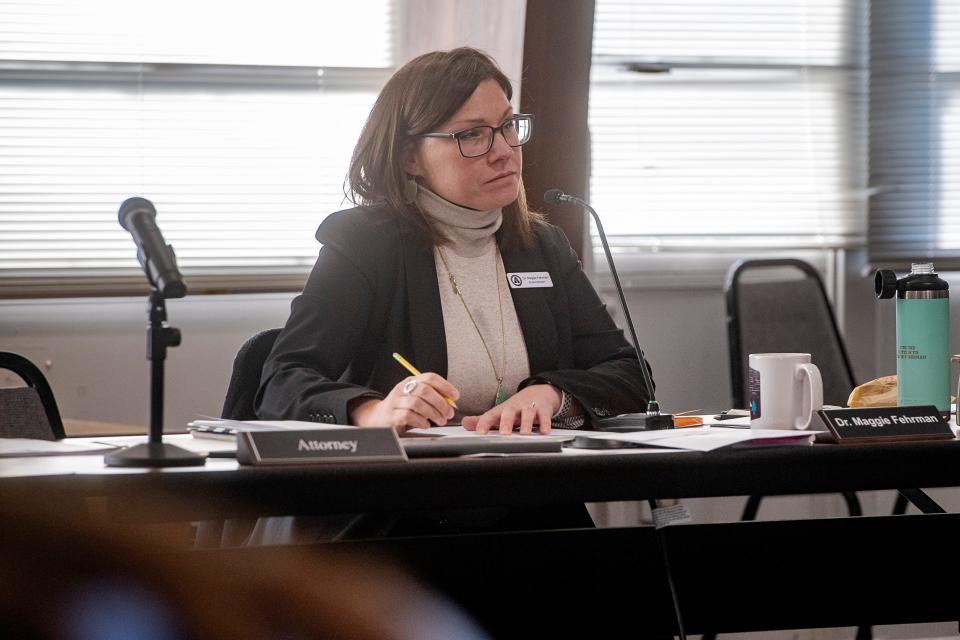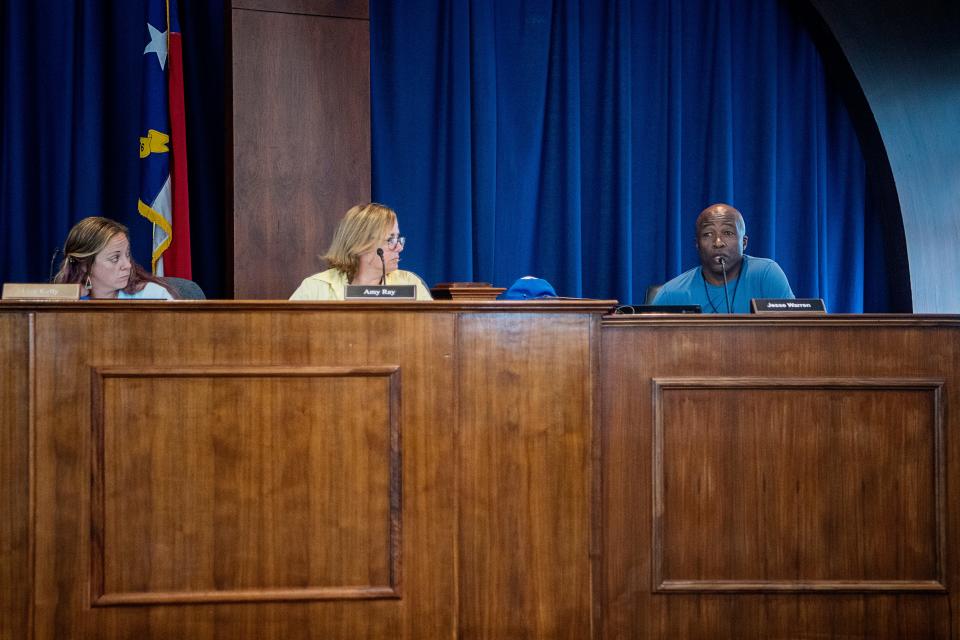Asheville schools adopts SB 49 policies; Board chair calls law 'misguided and obtuse'
ASHEVILLE - The city school board has adopted policies to bring the district into compliance under new state law SB 49, which area advocates fear will result in discrimination against LGBTQ+ students.
The law includes requirements that parents must be notified before their child uses a different name or pronouns in school, which critics of the law say will force students to be "outed" to parents, rather than allowing them to come out on their own terms.
It also bans curriculum on gender identity, sexual activity and sexuality from being taught in kindergarten through fourth-grade classrooms.

Asheville City Schools' Feb. 12 vote came after months of delays, bypassing a Jan. 1 deadline, as board members worked to soften and tweak policy language, in some cases removing requirements from policy entirely to address through district procedures instead, a move board members say will give them greater "flexibility."
Vice Chair Amy Ray, who is a lesbian, said the board attempted to adhere to the law "in a way that causes the least amount of harm while acknowledging that the purpose, in my opinion, of this law is to create harm."
“I am relieved that we have finished our very careful review of these policies that we had to put into place to comply with SB 49," Ray told the Citizen Times after the vote. "I remain personally frustrated and hurt for our families and our educators who are queer or identify as LGBTQ because having the state have a law that is intended to regulate curriculum that relates only to a minority of our students and their families is harmful and I hate, and I will always hate, that we had to do this."
SB 49 is known as both the "Parents' Bill of Rights" or, colloquially, North Carolina's version of the "Don't Say Gay" law.

'Our hands have been tied'
Each of the five policy votes, one per district policy where addendums were required, were unanimous. Suggested language was created by the N.C. School Boards Association to comply with SB 49. Most of the policies were heavily line-edited by the Asheville board.
In an amendment proposed prior to the vote on policy 1310, which contained some of the most controversial elements of the law, board member Sarah Thornburg edited large swathes of the policy, and in one section removed the language entirely, to be addressed instead by district procedures.
“We are stuck with the law," she said. "We have some flexibility as to what we put in procedures versus policies."
Ray said no books will be removed from classrooms as part of adherence to the law.
After the vote, Chair George Sieburg thanked his fellow board members for "countless" hours spent grappling with the law.
“At its core, we know that SB 49, or the so-called Parents’ Bill of Rights, seeks to harm our queer youth and families. As misguided and obtuse as this legislation is, it is written in such a crafty way that as a school board, our hands have been tied," Sieburg said.
"(SB 49) is a law. Whatever policies and practices we as a board and we as a district choose to enact, they do nothing to change the harmful effects of this law. Therefore refusing to pass the policies as a matter of moral principle would neither negate the law or protect the kids in our view.”

In addition to the revised policies, Sieburg said the board would be discussing a reform policy, also known as a district procedure, in its March work session to focus on further protections for students impacted by the legislation.
“This law and the policies around it do little to alter how our staff works with and supports our students, particularly our trans and queer youth," he said. "Before this bill, our staff listened to, loved and worked with our youth who are exploring who they are and who they need to be in this world. After this bill, after today and everyday hereafter, our staff will continue to listen to, love and work with our youth. This is their charge. It is our job as a board to make sure our staff can fulfill that charge.”
Edits are not enough to eliminate harm, advocates say
Asheville is among the last districts in the state to approve the required policies, said Craig White, supportive schools director for Asheville-based Campaign for Southern Equality. The law was passed in August after Republican lawmakers overrode the veto of Democratic Gov. Roy Cooper.
Thought White acknowledged the hard work of Asheville board members to reduce the policies' potential harm, he said it isn't enough.
"Less discrimination is not no discrimination," White told the Citizen Times in February.
“I think the board of education has threaded the needle as best they can on the policies that they’re passing," White said, "but in a lot of ways, it just kicks the problem downhill to make principles and teachers figure it out.”
White and others, like Allison Scott, also with the Campaign for Southern Equality, called on Asheville City Schools to follow the lead of the Chapel Hill-Carrboro school board. In January, the board defied state law by not approving policies around pronoun notifications or the K-4 curriculum restrictions — which White said are the elements of the law that most directly discriminate against transgender students.

Board members acknowledged that failing to implement one of the requirements of the state’s Parents’ Bill of Rights law could bring legal problems. But Chapel Hill-Carrboro Board Chair George Griffin said someone needs to “stand up for what’s right," reported the Raleigh News & Observer.
"Opposition," not workarounds, was the call from Scott at a Feb. 5 public comment period. This was echoed by others, as advocates for LGBTQ students urged Asheville's board members to reject the policies, entirely.
Legal implications for defiance are not clear.
When asked about repercussions for not adhering to certain elements of SB 49, Blair Rhoades, spokesperson for the North Carolina Department of Public Instruction, said "(p)arents can always consider suing the district if they are in disagreement with how a district has chosen to implement the policy."
Asheville board attorney Chris Campbell said the General Assembly and state will expect reports from school districts on their compliance in September.
Republican officials and candidates have criticized the Chapel Hill-Carrboro school board’s vote, WUNC reported in January. State Superintendent of Public Instruction Catherine Truitt called the vote “unacceptable” on a post on X, formerly known as Twitter.
Title IX violation?
The Campaign for Southern Equality argues that SB 49 violates Title IX, the federal law that bars discrimination based on sexual orientation and gender identity in public schools. It has filed both a federal Title IX complaint against the North Carolina State Board of Education and the North Carolina Department of Public Instruction, and another complaint against the Buncombe County Board of Education, which adopted its policies in December.
The complaint against the state has been received by the U.S. Department of Education's Office for Civil Rights and the Department of Justice, White said, and is in the queue for investigation.
After Buncombe County's Title IX coordinator declined to process the complaint, White said the campaign has filed its complaint with the Office for Civil Rights, both for its allegations that the county's policies are discriminatory, and to appeal the county's decision not to process the complaint.
Sieburg also thanked the campaign for its work around the legislation, and for the legal challenges against the law.
“Personally," he said, "I hope the complaint gets its fair day in court.”
More: Asheville City Schools again delay vote on SB49, 'Don't Say Gay' policies. What now?
More: Asheville Citizen Times donates 130 years of photo archives to UNCA for preservation
Sarah Honosky is the city government reporter for the Asheville Citizen Times, part of the USA TODAY Network. News Tips? Email shonosky@citizentimes.com or message on Twitter at @slhonosky. Please support local, daily journalism with a subscription to the Citizen Times.
This article originally appeared on Asheville Citizen Times: Asheville City Schools adopts 'Parents Bill of Rights' policies

